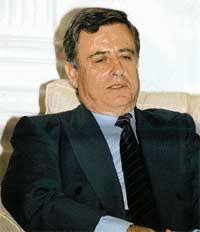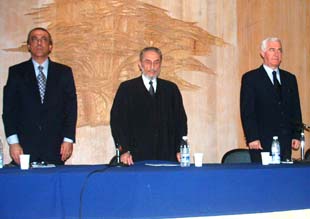Abdel Halim Khaddam, the Syrian Vice President, currently visiting Paris, raised questions about the true motives behind a potential attack on Iraq, expressing concerns over the potential disintegration of the country and the fragmentation of the entire region. During a press conference held after his discussions with French President Jacques Chirac, Khaddam stated that such an operation would effectively put Middle East oil resources “under American control.” He further emphasized that a military intervention in Iraq would have far-reaching consequences not only for Iraq itself but also for the entire region and possibly beyond. He pointed out that while Syria had opposed Iraq in the past due to its invasion of Kuwait, they now find themselves defending Iraq against the threat of invasion. Since 1990, when Syria joined the US-led coalition to expel Iraqi forces from Kuwait, relations between Damascus and Baghdad have significantly improved. Khaddam argued that a military action against Iraq would establish a dangerous precedent in international relations, allowing one country to launch an operation to change the situation in another country.
It is important to note that the United States has repeatedly stated its objective of regime change in Baghdad, aiming to establish a non-threatening government without weapons of mass destruction. Khaddam highlighted the opposition of Arab countries and many others to military action against Iraq, asserting that neighboring countries do not consider Iraq a threat. He further emphasized that there is no moral or political justification for military action against Iraq, especially considering the tight embargo it has faced for over a decade and the absence of weapons of mass destruction. Khaddam stressed that the issue of the return of United Nations weapons inspectors to Iraq should be considered as part of a larger picture, evaluating both the achievements and shortcomings in the realm of disarmament. He believed that Iraq should have the ability to determine its own fate once the inspectors’ work is completed. Khaddam questioned the undisclosed motives behind a military action against Iraq, speculating that the ultimate goal may be to control energy resources in the region. He pointed to the organized campaign by the United States against Saudi Arabia and asked how it could be explained. The Syrian vice president warned of the risks of dividing Iraq and destabilizing the Middle East, stating that such a situation would be unprecedented since World War II. He believed that such a goal aligns with Israel’s strategic objective of weakening and disintegrating the Arab world, emphasizing the importance of Iraq’s unity for the benefit of the country and its neighboring nations. Lastly, in response to a journalist’s question regarding the statements made by French Foreign Minister Dominique de Villepin, who described the Iraqi regime as a dictatorship, Khaddam posed the question as to why similar attributes were not used during the Iraq-Iran war.



